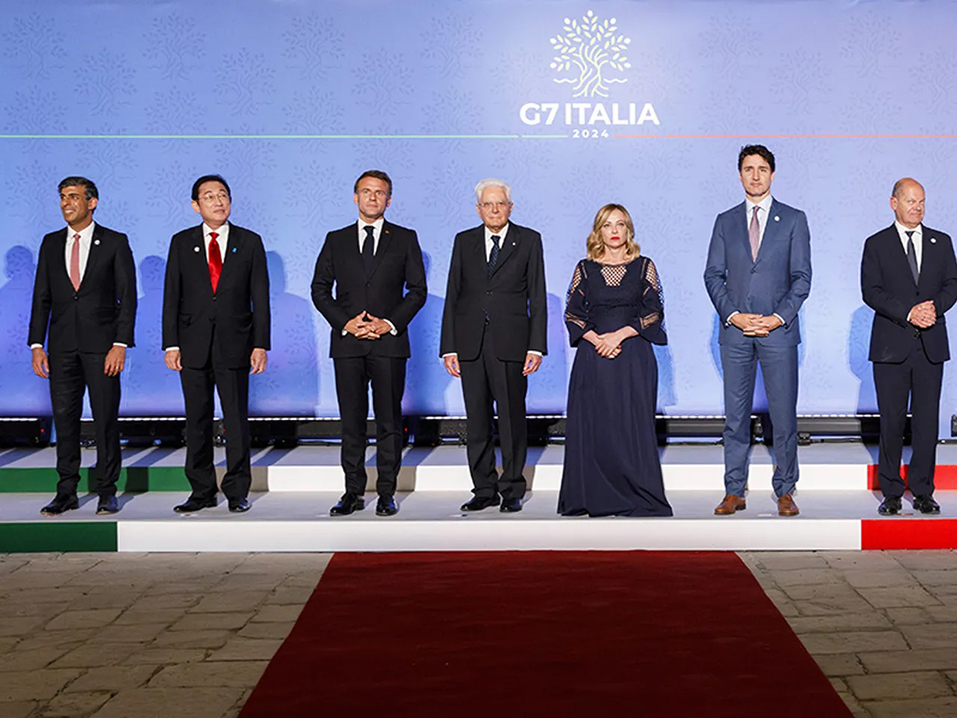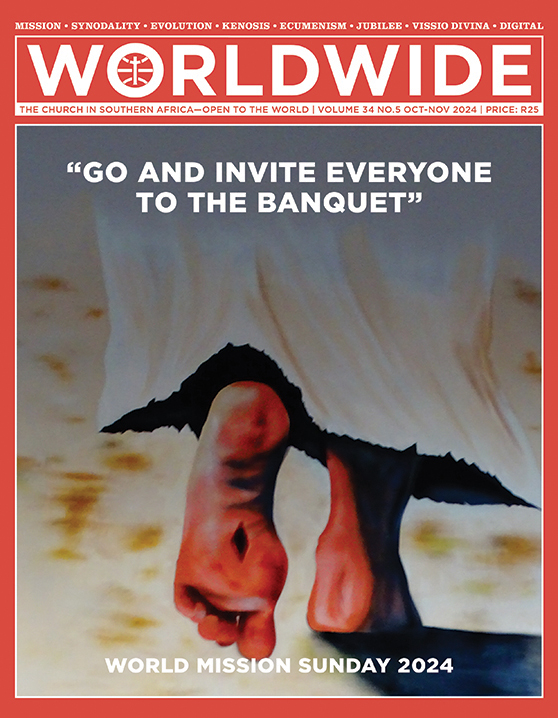
“GO AND INVITE EVERYONE TO THE BANQUET”
The image represents the feet of the Risen Jesus, in motion, showing the wounds of his Passion, yet ready to reach out and invite all to the banquet of his mercy. Likewise, Jesus invites to us to his mission in co-responsibility to bear witness to the power of his resurrection and to bring Jesus’ message of peace and fraternity to the whole world.
REFLECTIONS • 2024 WORLD MISSION SUNDAY
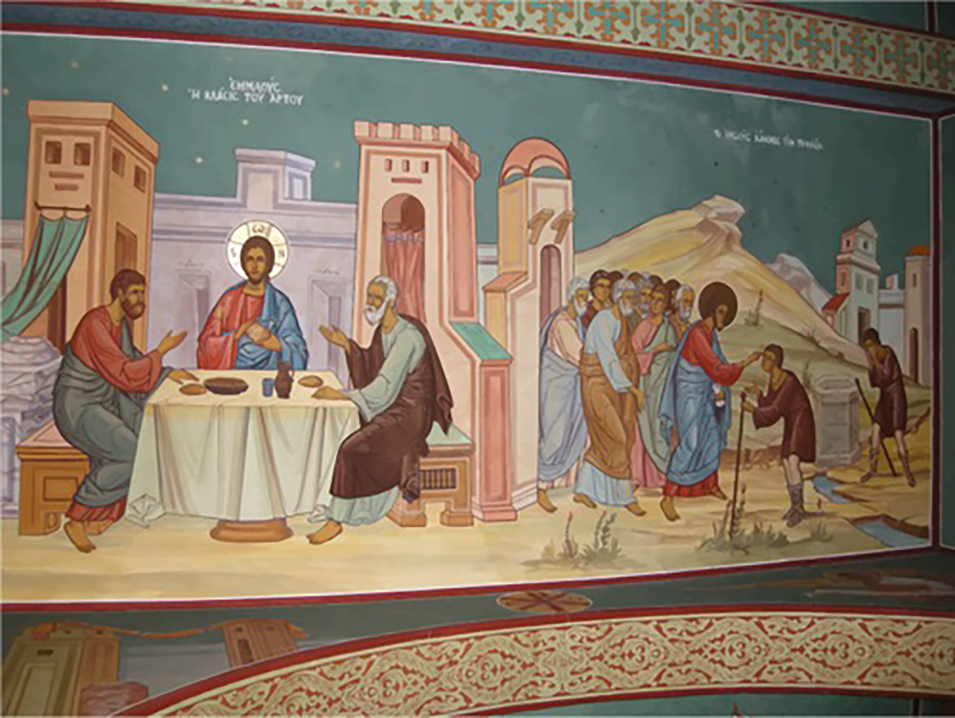
Pope Francis’ message for the 2024 World Mission Sunday is written in a context marked by the Church’s synodal journey as well as the preparations for the 2025 Jubilee. Pope Francis invites the Church to rediscover her missionary vocation through a reflection on the parable of the wedding feast (Mt 22:1-14), which symbolises God’s universal call.
THE UNIVERSAL MISSION OF THE CHURCH: AN INVITATION TO THE EUCHARIST AND TO SYNODALITY
BY SR ANNE BÉATRICE FAYE* CIC | AFRICAN GROUP FOR RESEARCH IN INTERCULTURAL PHILOSOPHY (GARPI), SENEGAL, DAKAR
THE WEDDING feast story illustrates the inclusive nature of the Christian mission: an invitation open to all, without distinction. In this context, World Mission Sunday becomes a privileged opportunity to renew the Church’s missionary commitment, in keeping with the synodal spirit and the vision of Jubilee 2025: “Pilgrims of Hope”.
‘Go and Invite’
Pope Francis’ message, inspired by the king’s command in the parable of the wedding feast, highlights the missionary invitation, intended for all humanity, that lies at the heart of the Church. Christian mission, motivated by God’s unconditional love, reflects God’s desire to reach every human being, even those who seem indifferent or opposed to His divine call. Missionaries ad gentes embody this commitment by leaving their homeland to meet others in often difficult contexts. Their witness reminds us that mission is an act of service and fraternity, an echo of God’s tireless quest for the guests, all of whom have been invited to participate at the banquet. However, the Pope emphasises that this mission is not limited to priests and religious. Every baptised person is invited to take an active part in the evangelisation, whether in his or her family, workplace or social relationships.
Today, the Church—faced with change in the place of mission due to a number of factors, including changes in the world, excesses of power and clericalism, but also numerous opportunities—wants to ensure that the lay faithful have a place to which they are entitled, particularly in decision-making. In synodal language, it implies that:
“Journeying together is the constitutive path of the Church; the quality that enables us to interpret the reality with the eyes and the heart of God; the condition to follow the Lord Jesus and being servants of life in these wounded times. The breath and the path of the Synod reveal who we are and the dynamism of communion that animates our decisions.” (Pope Francis 2017)
In a synodal Church, this mission becomes a shared commitment. The synodal process reminds us that the mission must be lived collectively, with active participation and co-responsibility by all. This dynamic encourages all Christians to go beyond their personal boundaries to share the Good News, making the missionary invitation a universal one.
The Church is called to be a home which is open to all, a community that embraces the excluded, the marginalised and those rejected by society.
Eucharistic and Eschatological Mission
Matthew’s parable of the wedding feast presents the banquet as an image of the Kingdom of God. This eschatological feast, to which we are all invited, symbolises the offering of salvation and communion with God. Pope Francis links this invitation to the Church’s mission, reminding us that the Eucharist, at the heart of Christian life, is an anticipation of this final banquet. Every Eucharistic celebration is a missionary moment, a time of renewal for the faithful, inviting them to take the Gospel beyond the walls of the Church. The Eucharist transforms believers into active witnesses to God’s love, sending them out into the world to invite others to share in this joy. It is not just a liturgical rite, but a missionary act, a call to be agents of social and spiritual transformation.
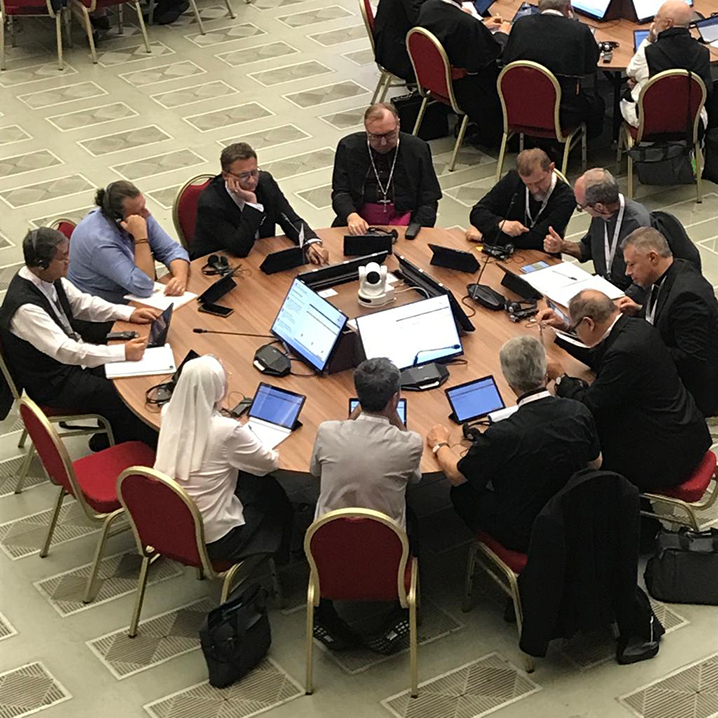

The Eucharistic dimension of the mission also underlines the responsibility of Christians to be builders of peace and justice in the places where they live. By living the Eucharist, each member of the faithful participates in the Church’s mission by bearing witness to the presence of Christ and by building bridges between communities.
All Welcome
The parable of the wedding insists on the universality of God’s call. The king invites everyone, good and bad, to take part in the banquet. This image reflects the radical inclusiveness of the Christian mission, which does not discriminate, but welcomes everyone unconditionally. The Church is called to be a home which is open to all, a community that embraces the excluded, the marginalised and those rejected by society.
In his message, Pope Francis reminds us of the importance of being a Church that is synodal and missionary, “on exit,” reaching out to the human peripheries. Synodality, as a way of life and governance, encourages the Church to listen to and to include all voices, especially those of the most vulnerable. By welcoming everyone regardless of their differences, the Church becomes a living sign of God’s universal love.
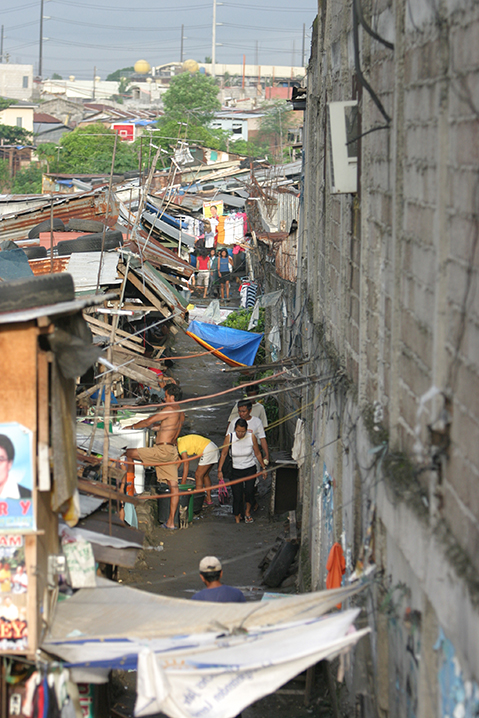
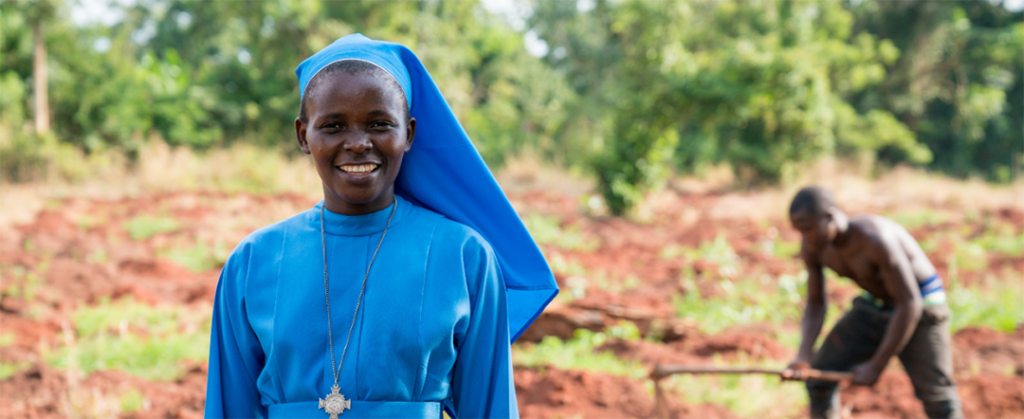
The Church’s inclusiveness is also evident in its work with migrants, the poor and the oppressed. By embracing a mission without borders, the Church bears witness to the dignity of every person, an essential principle in a world often marked by exclusion and division.
Synodality and Mission
By responding to God’s invitation, every baptised person becomes a pilgrim of hope, committed to a mission which transcends borders and differences. This universal mission, rooted in inclusiveness and co-responsibility, calls the Church to be a living and dynamic community, continually moving towards the Kingdom. The synodal journey and the preparations for the Jubilee of 2025 are privileged opportunities to renew this missionary commitment. Together, as a synodal and missionary Church, we are invited to walk with humanity, bearing witness to the joy of the Gospel and building bridges of hope in a world that so desperately needs them.
Mary, Star of the Evangelisation
The Pope concludes his message by invoking Mary, Star of evangelisation and model of missionary commitment. Present at key moments in the life of Jesus, Mary embodies total availability to God’s will and unconditional acceptance of others. Her intercession is a precious support for the Church on her mission, and her example of faith, prayer and service guides all Christians. Mary shows us that mission begins by listening attentively to God and to others. By following her example, the Church is called to live her mission with tenderness and compassion, in the image of Mary’s maternal love. She reminds us that evangelisation is not just a task, but an act of love, a gift of self for the good of all.
In conclusion, Pope Francis’ message for 2024 World Mission Sunday invites the Church to rediscover her mission from a synodal and Eucharistic perspective. By responding to God’s invitation, every baptised person becomes a pilgrim of hope, committed to a mission that transcends borders and differences.
Sr Anne Béatrice Faye from Senegal is a member of the Congregation of the Sisters of Our Lady of the Immaculate Conception of Castres (CIC). She holds a PhD and is also part of the Commission of Theologians for the Synod on Synodality. She teaches at the Ecumenical Institute of Theology Al Mowafaqa in Rabat, Morocco and in the Philosophical Centre of Saint Augustin in Dakar, Senegal.

